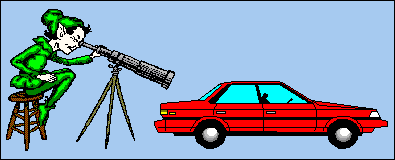

The United States Supreme Court ruled unanimously last month that police officers with probable cause to believe that a traffic violation has occurred may stop a motor vehicle even though the stop would seem to be a pretext to search for drugs.
The landmark decision of Whren v. United States (June 10, 1996) arose in the District of Columbia. Plain-clothes police officers, patrolling a high-drug area in an unmarked vehicle, observed a truck driven by James L. Brown waiting at a stop sign for an unusually long time. Suddenly, the truck turned without signalling and drove off at an unreasonable speed. An officer stopped the vehicle, supposedly to warn the driver about traffic violations, and upon approaching the truck, the officer observed plastic bags of crack cocaine in Whren's hands.
The defendant argued that the traffic stop was "pretextual." A stop is pretextual when a police officer uses a minor traffic violation to justify an investigation of a vague suspicion that the motorist may be engaging in illegal activity. Some courts held that if the initial traffic stop was just a pretense to search for drugs, and if there was no specific and articulable reasons to stop the car for a drug search, the stop was not permitted. Other courts said that a pretextual traffic stop occurs when a driver is stopped for a commonly occurring traffic violation for which a reasonable officer would not normally make an arrest.
In 1995, the Ohio Ninth District Court of Appeals ruled on pretextual stops in a Medina County case. That court, which also covers Wayne County, held that if there are specific and articulable facts available to a police office that indicate that a motorist may be committing a criminal act, including a minor violation of traffic laws, the officer may make an investigative stop. Thus, in our county, the law was already clear that police officers could make a traffic stop based upon violations of the traffic code, even when the stop was also made to confirm a hunch that drugs might be present.
However, the decision by the United States Supreme Court settles the issue for law enforcement officers everywhere in the United States. It eliminates the possibility that a local court, in an extreme case, might consider the argument of a pretextual traffic stop to suppress evidence of a drug offense.
In Whren, the United States Supreme Court also dealt with the issue of plain-clothes officers driving an unmarked car and effecting a traffic arrest. The defendants in that case argued that a traffic stop made by an out-of-uniform officer was such an extreme practice that it was clearly a pretext to search for drugs. The high court ruled that the officer's subjective intent, alone, does not make otherwise lawful conduct illegal or unconstitutional. Since the plain-clothes officers in the unmarked car had probable cause to believe that the petitioners had violated the traffic code, the stop was reasonable under the Fourth Amendment and the evidence discovered was admissible.
One word of caution: this last ruling does not change the provision of Ohio Evidence Rule 601 which prohibits an officer from testifying in a case where the officer [1] was on duty mainly or exclusively to enforce traffic laws and [2] was arresting or assisting in an arrest for midemeanor traffic violations, unless the officer was:
In other words, a plain-clothes officer in an unmarked car may stop a vehicle for misdemeanor traffic violations, and the officer will still be able to testify in court, so long as the officer was not mainly or exclusively on duty for traffic enforcement. However, plain-clothes officers and unmarked cars are still improper for regular traffic patrol.
Have you ever watched a criminal defendant making offensive gestures and facial expressions during the testimony of the prosecution's witnesses? Did you hope that the jury saw those antics? The Ohio Supreme Court recently held that the "accused's face and body are physical evidence, and a prosecutor can comment on them." State v. Hill (1996), 75 Ohio St. 3d 195,203. Criminals take notice: we will be watching you!